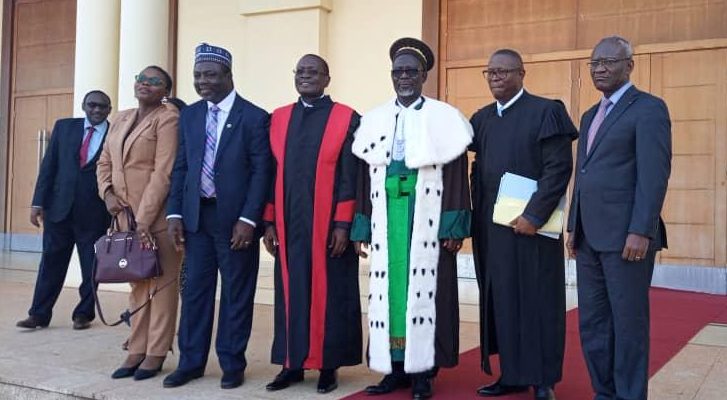Two new judges sworn-in to ECOWAS Court
The two are replacing justices Keikura Bangura and Januaria Tavares Silva Moreira Costa, both of Sierra Leone and Cape Verde respectively, who recently completed their tenures.

Two new judges were on Thursday, October 6, 2022 sworn-in to the ECOWAS Court of Justice by the Chairman of the Authority of Heads of State and Government of the Community, President Umaro Sissoco Embalo of Guinea Bissau at a ceremony in Bissau.
They are Justices Sengu Mohammed Koroma, a Justice of Sierra Leone’s Supreme Court, and Claudio Monteiro Goncalves from Cape Verde.
The two are replacing justices Keikura Bangura and Januaria Tavares Silva Moreira Costa, both of Sierra Leone and Cape Verde respectively, who recently completed their tenures.
The new judges will join other justices from Ghana, Nigeria, and Cote d’Ivoire to form the panel of five independent Judges that sit on the ECOWAS Court bench.
“Following their swearing in, the President of the Court, Justice Asante welcomed them to the team and expressed the hope that they will contribute to strengthening the Court’s rich jurisprudence during their four-year tenure,” the court said on its website.
Justice Amoako Asante is further quoted as saying: “We are excited at their appointment by the leaders of ECOWAS and look forward to their resumption of duty so that they can contribute their quota to reducing the Court’s bulging case docket.”
The ECOWAS Community Court of Justice was created pursuant to the provisions of Articles 6 and 15 of the Revised Treaty of the Economic Community of West African States (ECOWAS).
Its Organisational framework, functioning mechanism, powers, and procedure applicable before it are set out in Protocol A/P1/7/91 of 6 July 1991, Supplementary Protocol A/SP.1/01/05 of 19 January 2005, Supplementary Protocol A/SP.2/06/06 of 14 June 2006, Regulation of 3 June 2002, and Supplementary Regulation C/REG.2/06/06 of 13 June 2006.
Composition
The Court is composed of five (5) independent Judges who are persons of high moral character, appointed by the Authority of Heads of State of Government, from nationals of Member States, for a four-year term of office, upon recommendation of the Community Judicial council.
Mandate
The Mandate of the Court is to ensure the observance of law and of the principles of equity and in the interpretation and application of the provisions of the Revised Treat and all other subsidiary legal instruments adopted by the Community.


